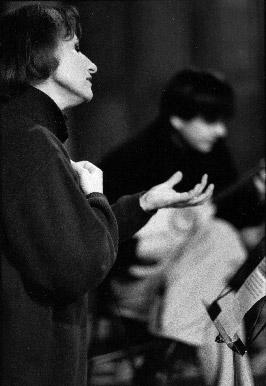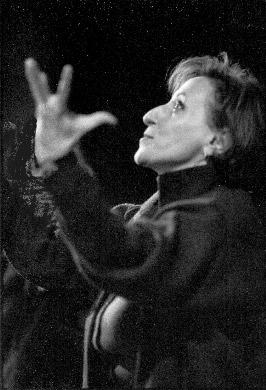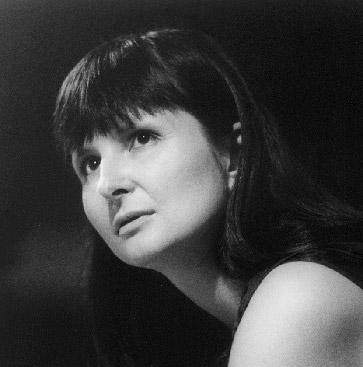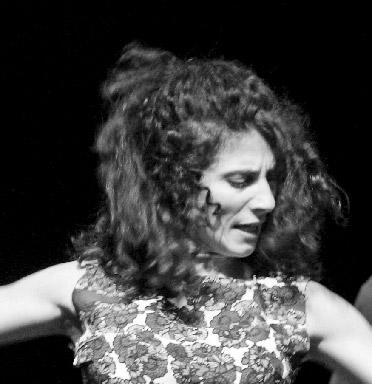
謝謝 With thanks to


謝謝 With thanks to

香港大會堂音樂廳
Concert Hall
Hong Kong City Hall
節目長約1 小時10 分鐘,不設中場休息
Running time: approximately 1 hour and 10 minutes with no interval
為了讓大家對這次演出留下美好印 象,請切記在節目開始前關掉手錶、 無㵟電話及傳呼機的響鬧裝置。會場 內請勿擅自攝影、錄音或錄影,亦不 可飲食和吸煙,多謝合作。
To make this performance a pleasant experience for the artists and other members of the audience, PLEASE switch off your alarm watches, MOBILE PHONES and PAGERS. Eating and drinking, unauthorised photography and audio or video recording are forbidden in the auditorium. Thank you for your cooperation. 樂團成員
演唱 Singer

露西拉.加利亞齊 Lucilla Galeazzi
樂手 Musicians
雙頸低音大琵琶/巴羅克結他/總監
Theorbo/Baroque Guitar/Director
克里斯蒂娜.普盧哈 Christina Pluhar
薩泰里琴 Psalterion
瑪吉.尤伯諾佳 Margit ¨ Ubellacker
敲擊結他/巴羅克結他
Chitarra Battente and Baroque Guitar
馬塞洛.維塔里 Marcello Vitale
巴羅克小提琴
Baroque Violin
亞歷山德羅.坦佩尼 Alessandro Tampieri
短號 Cornet
多倫.沙溫 Doron Sherwin
古鍵琴/敲擊樂 Harpsichord and Percussion
弗朗西斯科.特里西 Francesco Turrisi
低音大提琴 Double Bass
鮑里斯.施密特 Boris Schmidt
敲擊樂 Percussion
戴維.梅奧奴 David Mayoral

舞蹈 Dance
安娜.德戈 Anna Dego

蛛是在拿坡里發現的一種有 毒蜘蛛,被咬者會昏昏欲
睡,不省人事,甚至喪命。
很多人相信,狼蛛的毒汁每天都不 同,甚至每小時都在變化,因為被咬 的人,會有形形色色的反應:有些高 歌,有些大笑,有些低泣,有的則不 停大聲呼喊;有些人被咬後進入睡 鄉,另一些人卻無法入眠;一些人嘔 吐,或者流汗,又或顫抖︙︙ 古老相傳,音樂可以解除狼蛛毒。一
般相信,如果有人被某種狼蛛咬了的 話,必須以對應的音樂或歌曲治療。
例如有人被抑鬱型狼蛛咬了,他會變 得沒精打采、懶散及懨懨欲睡;如果 被暴躁型咬傷,人會變得動輒暴跳如 雷,喜怒無常,焦躁不安,狂怒不 已,大有機會殺人,捏着你的脖子不 放。一旦被咬,惟一的解藥是舞蹈和 音樂;中毒的徵狀及原因不同,用以 治療的音樂形式自也相異。中世紀以 來,大家都把解藥稱之為「塔朗特舞 曲」。
這些治療蛛毒的音樂是音樂史中首批 見諸樂譜的塔朗特舞曲,况面出現的 頑固低音和旋律,在今天意大利南部 的民間音樂中仍可找到其變體。音 樂、舞蹈和顏色,是治療的重點,器 樂的譜寫方法也舉足輕重。琵音古樂 團的演出,說明塔朗特舞曲令人神往 的節奏,對演出者和觀眾魅力不減。
The tarantula is a venomous spider found in the kingdom of Naples, whose bite makes men very drowsy, and often unconscious, and can also be fatal. Many people believe that the tarantula’s venom changes in quality from day to day, or from hour to hour, for it induces great diversity of passions in those who are bitten: some sing, others laugh, others weep, others cry out unceasingly; some sleep whilst others are unable to sleep; some vomit, or sweat, or tremble...
Since time immemorial it has been said that music can cure the tarantula’s poison. The popular belief was that when a person was bitten by one sort of tarantula or another, it was necessary to use the right sort of music or song for him. Thus when someone was wounded by the Melancholy Tarantula, he became lethargic, indolent and sleepy. If he was bitten by one of the choleric variety, it made him choleric, inconstant, restless, furious and inclined to murder and strangling. Once the person was bitten, the only treatment was dancing and music. As varied as the symptoms and causes of the illness, so were the musical forms that were meant to cure them. The remedy for the disease has been known since the Middle Ages as ‘tarantismo’.
The music pieces on the treatment of tarantism are the first written tarantellas in musical history, and contain a whole string of ostinato basses and melodies which with slight variants are still to be found today in the folk music of southern Italy. Music, dance and colour are central to the therapy and great significance is attached to the instrumentation. L’Arpeggiata demonstrates that the captivating rhythms of the tarantella are still capable of luring performers and listeners alike.

是晚演出曲目或次序或有更改 Songs and their order of performance are subject to change
露西拉.加利亞齊 啊,美好生活!
馬里斯奧.卡薩提 夏康舞曲(器樂)
阿塔納修斯.柯切爾
拿坡里塔朗特舞曲(器樂)
傳統民歌
我的庇絲卡麗娜
馬迪奧.薩瓦多爾 乞丐之歌
傳統民歌/阿塔納修斯.柯切爾 卡皮尼斯之歌
即興
貝加馬斯卡(器樂)
加納利(器樂)
安東利奧.伯特利
夏康舞曲(器樂)
馬塞洛.維塔里
摩斯舞曲(器樂)
吉羅拉莫.卡斯貝爾格 琶音(器樂)
Lucilla Galeazzi
Ah, vita bella!
Ah, the good life!
Maurizio Cazzati
Ciaccona
Chaconne (instrumental)
Athanasius Kircher
Tarantella napolitana, Tono hypodorico
Neapolitan Tarantella (instrumental)
Traditional
Pizzicarella mia
My Little Scallyway
Matteo Salvatore
Lamento dei mendicanti
Song of the Paupers
Traditional/Athanasius Kircher
La Carpinese
The Carpinese
Improvisation
Bergamasca (instrumental)
Canario (instrumental)
Antonio Bertali
Ciaccona
Chaconne (instrumental)
Marcello Vitale
Moresca
Moorish Dance (instrumental)
Girolamo Kapsberger
L’ Arpeggiata (instrumental)
安波左.史柏勒拿 夢吧,我的小花
傳統民歌/阿塔納修斯.柯切爾 意大利塔朗特舞曲(器樂)
馬塞洛.維塔里 瑪利亞.迪拿度之塔朗特舞曲(器樂)
即興
西班牙日(器樂)
露西拉.加利亞齊 貓兒吹風笛
聖地雅歌.迪梅西亞
西班牙舞曲(器樂)
露西拉.加利亞齊
我想要座房子
即興
哈卡拉舞曲(器樂)
安德烈亞.福爾肯尼洛 甜美的旋律(器樂)
傳統民統
可憐的小安東尼(葬禮之歌)
阿塔納修斯.柯切爾
塔朗特解藥(器樂)
Ambrogio Sparagna
Sogna fiore mio
Dream, my flower
Traditional/Athanasius Kircher
Tarantella Italiana
Italian Tarantella (instrumental)
Marcello Vitale
Tarantella à Maria di’ Nardo
Tarantella for Maria di Nardo (instrumental)
Improvisation
La dia Spagnola
The Spanish Day (instrumental)
Lucilla Galeazzi
Lu gattu la sonava la zampogna
The Cat was Playing the Bagpipes
Santiago de Murcia
Fandango (instrumental)
Lucilla Galeazzi
Voglio una casa
I Want a House
Improvisation
Jacaras (instrumental)
Andrea Falconiero
La Suave Melodia
The Sweet Melody (instrumental)
Traditional
Lu povero ‘Ntonuccio (Lamento funerbre)
Poor Little Anthony (Funeral Song)
Athanasius Kircher
Antidotum Tarantulae
Antidote for Tarantism (instrumental)
Lucilla Galeazzi
露西拉.加利亞齊
Ah, vita bella!
Ah, the good life!
啊,美好生活

S’e fatta mezzanotte ma notte scura scura, s’e fatta mezzanotte dorme la luna.
S’e fatta mezzanotte ed era pieno giorno di colpo mi si è spenta la luce intorno.
S’e fatta mezzanotte ed io non so perché.
Ti piacevano le salsicce mo non le mangi più ti piacevano le ciliegie mo non le mangi più ti piaceva fare l’amore a tutte quante l’ore
Ah! Vita bella, perché non torni più?
Ti piaceva il pane caldo ti piaceva pasta e fagioli ti piaceva la tua famiglia ti piacevano i tuoi figlioli... ti piaceva la festa e il ballo ti piaceva andare a cavallo, Ah! Vita bella, perché non torni più?
Ti piaceva il profumo dei fiori Mo non lo senti più ti piaceva la campagna mo’ non lo vedi più ti piaceva stare a guardare il sole quando si tuffa in mare. Ah, vita bella! Perché non torni più?
It is midnight
On a very, very dark night, It is midnight, The moon is asleep. It is midnight, But it was broad daylight, Suddenly the light Went away. It is midnight
And I know not why!
You used to like sausages, But now you don’t eat them. You used to like cherries, But now you don’t eat them. You used to like making love At any time of the day.
Ah, the good life! Why don’t you return?
You used to like warm bread, You used to like pasta and beans. You used to love your family, You used to love your children, You used to like fun and dance, You used to like riding on horseback.
Ah, the good life! Why don’t you return?
You used to like the scent of flowers, Now you don’t even sniff them... You used to like the countryside, Now you don’t even notice it... You used to like watching the sun, As it set over the sea.
Ah, the good life! Why don’t you return?
午夜時分
夜色最是深沉 午夜時分 明月亦已高枕 午夜時分 昔時白晝何堪 剎那光華散盡 緣何又是夜深!
昔日你愛吃香腸 今天卻一口不嚐 昔日你愛吃櫻桃 今天卻推推讓讓 昔日你雲雨無厭 分分秒秒春心癢 啊,美好生活!何不再臨?
你往日愛吃熱麵包 豆和麵條都覺香 你往日深愛着家人 兒女幸福總惦量 你往日愛跳舞玩樂 騎在馬背便心歡暢 啊,美好生活!何不再臨?
你總是愛花芬芳 現在聞一聞也不想 你總愛留連郊野 現在城外風光不放心上 你總愛看日落倒影 在海波上蕩漾 啊,美好生活!何不再臨?
Traditional
傳統民歌
Pizzicarella mia
My Little Scallywag
我的庇絲卡麗娜
Matteo Salvatore
馬迪奧.薩瓦多爾
Lamento dei mendicanti
Song of the Paupers
乞丐之歌
Traditional / Athanasius Kircher
傳統民歌/阿塔納修斯.柯切爾
La Carpinese
The Carpinese
卡皮尼斯之歌
Pizzicarella mia, pizzicarella lu camminatu to’ la li li la lu camminatu to’ pare ca balla
A du te pizzicau ca no te scerne?
sutta lu giru o la li li la sutta lu giru giru di la suttana.
Quantu t’amau t’amau lu core miu mo nun tte ama chiù la li li la mo nun tte ama chiù se ne scerrau. Te l’ura ca te vitti te ‘mmirai ‘nu segnu fici a la li li la ‘nu segnu fici a mmienzu a ll’occhi toi.
Ca quiddu foì nu segnu particolare cu no’ te scerri a la li li la cu nu te scerri de l’amore toi. Amore amore ce m’hai fattu fare de quindici anni a la li li la, de quindici anni m’hai fatto impazzire.
Pizzicarella mia, pizzicarella lu camminatu to’ la li li la lu camminatu to’ pare ca balla
Facite l’alamosena a ‘sti pezzente e quedde ca ce dete nui pigghieme quedde ca dete a nui vanne ch’li morte arrefreschete l’anema d’lu priatorie
Li puverette tutti ce l’anne dete li ricchi ‘nc’anne avute dà nu stozze o Gesù Criste tu l’ a fa’ murì li ricchi lu pene a nnui nun ’nce l’anne dete Lu sacche già è chiene nu ci li eme li figghi a nui ci aspettene c’anna a magnà li chene tirene verse la chesa nostra li figghi vonnu lu pene ann’a magnà E sime arrivete a li mura nostra li figghi a nui ce venne a cumprentà ch’li mene dint’ lu sacche pigghianu lu pene magnete figghi mia fino a quanno ve saziete.
Pigliate la palette e vae pi’ffoco
E va’alla casa di lu ‘nammurato
E passa duje ore ‘e juoco.
Si mamma se n’addona ‘e chiste juoco
Dille ca so’ state falelle de foco,
E vule di’ e llà, chello che vo’ la femmena fa!
Luce lu sole quanno & egrave; buono tiempo, Luce lu pettu tujo, donna galante
Mpietto li tieni duje pugnali argiento.
A chi li tocchi bella, nci fa santo,
E ti li tocchi je ca so’ l’amante
E’m Paraviso jamme certamente...
E vule di’ e llà, chello che vo’ la femmena fa!
My little scallywag,
The way you walk, la li li la, The way you walk is like dancing...
Where were you pinched, that you never stop?
Beneath the band, o la li li la, Beneath the band of your petticoat...
Oh how my heart loved you:
But now it loves you, la li li la, Now it loves you no more, it is shut. Ever since I set eyes on you, I admired you, And I made a mark, a la li li la, I made a mark between your eyes. And it was a special sign
So you would not shut, a la li li la, So you would not shut your heart to love. O Love, Love, what you make me do!
For fifteen years, a la li li la, For fifteen years, you’ve been driving me mad.
My little scallywag,
The way you walk, la li li la,
Give alms to these paupers, We accept everything you give; What you give is a blessing for the dead
To relieve the souls in Purgatory.
Poor men like us have given what they could,
The rich, not even a bit of bread!
Ah, Jesus! You must make them die!
The rich have given us nothing!
The bag is full, now we shall leave, Our children await us for food,
The dogs see us home.
The children want bread: they’re hungry.
And here we are back home.
The starving children come to meet us
Their hands in the bag, they take the bread: Eat, children, ‘till your hunger is satisfied.
Take the shovel and rekindle the fire, Go to your loved one
And spend two hours in sport. If your mother shows anger at your sporting, Tell her your face is red from the fire.
Say what you like to her, a woman does as she pleases! The sun shines when the weather is fine, Your breasts are radiant, gentle lady, Your bosom conceals two silver daggers. He who touches them, my beauty, becomes a saint. And I touch them, I who am the lover. No doubt we shall go to Paradise.
Say what you like to her, a woman does as she pleases.
我的小無賴
你走起路來,啦哩哩啦 就像跳舞︙︙
你給人捏了哪處,教你停不下來? 在領口之下,噢啦哩哩啦 在你衣裳領口下 我曾經多麼愛你︙︙ 可是我的心,啦哩哩啦 現在已不再愛你,心已關了 自從我看見你,就仰慕你 我作了個記號,呀啦哩哩啦 在你雙眼之中 作了個特別記號 好讓你不會關閉,呀啦哩哩啦 不會關閉心扉拒絕去愛 啊愛情,令我有此作為! 十五年來,呀啦哩哩啦 十五年來,你讓我神魂顛倒 我的小無賴 你走起路來,啦哩哩啦
拿起鏟子,重燃爐火 走到愛人身邊 花一個時辰廝磨 若母親怪你嬉鬧 告訴她,爐火照紅你的臉 你儘管說吧,女人是率性而為! 天氣好時陽光放晴 你胸脯放光,溫婉良人 你胸前藏着兩把銀色匕首。 我的美人,誰觸摸匕首便成聖人 而我這情郎觸摸了 我們將共赴天堂 你儘管說吧,女人是率性而為! 好心施予乞丐 我們什麼都接受 你的救濟讓死者蒙恩 為煉獄中的靈魂解憂 窮苦的人已付出一切 富有者連片麵包也不放手! 主耶穌,叫他們去死吧! 有錢人給我們的啥也沒有! 袋子盈滿,我們得離開 孩子正等待食物 狗兒目送我們回家 孩子想吃麵包,他們飢餓太久 此刻回到破屋 餓壞的孩子衝出門口 小手伸進袋子拿出麵包 吃吧,孩子,直至吃飽
Ambrogio Sparagna 安波左.史柏勒拿
Sogna fiore mio
Dream, my flower
夢吧,我的小花

Lucilla Galeazzi 露西拉.加利亞齊
Lu gattu la sonava la zampogna
The Cat was Playing the Bagpipes
貓兒吹風笛
Sogna fiore mio, sogna e riposa
Chiude sta vocca che pare na rosa
Sogna e chiude gli occhi tunne tunne
Ca quanne sogni tu sogna gliu munne
Chiude gli occhi e nun parlare
Sogna gliu funne di gliu mare
Chiude gli occhi e nun avè paura
Sogna nu munne fatta a sunature.
Sogna lu ventu e sogna la tempesta
Sogna gliu mare e sogna la foresta
Ca la musica de st’organetto
Te riempe ‘ncore e te scaveta ‘mpette
E raziulella mia nun parlare
Nun’`è cchiù tempe ‘de rifiatare
Oggi hai finite de disperare
Dopedimani jamma a faticare.
Ch gl’amma da fare nu gran castelle
Piene de tante cose belle
Gl’ammma da fare d’ore e d’argente
c’hanna abitare tutta la gente
E ogni jorne sarà allegria
E ci sarà pure mamma mia
E la fatia nun sarà cchi`ù amara
Pecchè saremo allora tutti quanti uguale.
Sogna fiore mio sogna e riposa
St’occhi toi so` comme li rose
Sogna tutti sti cose belle
Gliu cielo...gliu mare e tutte li stelle
E sogna sogna e nun tardare
E falla subito reposare
E scegne sogne e se non vo`venire
Co chesta musica falla addormire.
Lu gattu la sonava la zampogna
Lu sorce la davanti je ballava
La gallinella rifacea lu lettu
E lu gallettu je lu mesticava
Quante canzoni e quante canzonette
La famijola me le fa scordane
Chi vo’ le scarpe e chi vo’ le carzette
Chi su la mezzanotte vo’ lo pane.
E mo’ che me credea d’ave’ finitu
E chi vo’ pijàj moje e chi maritu.
Dream, my flower, dream and rest, Close your rosy lips. Dream and close your wide, wide eyes, For when you dream, the world dreams. Close your eyes and say no more, Dream of the deep, deep sea. Close your eyes and have no fear, Dream of a world full of musicians.
Dream of the wind and dream of the storm, Dream of the sea and dream of the forest. The music of this barrel organ Fills your heart and moves your breast, And, my pretty one, speak not, This is not the time for sighing. Today your despair is over, After tomorrow we’re going to work.
We’ll build a great castle Full of fine things. We’ll make it of gold and silver, With room for everyone, And every day will be full of gaiety, And my mother will be there too, And our fatigue will no longer be bitter For we shall all be equal.
Dream, my flower, dream and rest, Your eyes are like roses, Dream of all those pleasant things: The sky... the sea and all the stars. Dream and go on dreaming now. And now let her take her rest, Sleep descends, and if it will not come, Let this music lull her to sleep.
The cat was playing the bagpipes, The mouse was dancing before him; The hen was making the bed and the cock was plumping the mattress. What a lot of songs and ditties! Enough to make me forget my small family. And who wants shoes and socks? And who wants bread at midnight? And now, just when I thought I’d finished Who wants to take a wife and who seeks a husband?
夢吧,我的小花,好好休息 閉上瑰色雙唇 瞌上既圓且大的眼睛 世界與你共進夢境 閉上眼,別張聲 夢進深邃大海 閉上眼,別顫驚 夢中處處有音樂呼應 夢見風吹,又見雨打 夢見汪洋,又見森林 手搖風琴的樂音 注入肺腑,感動你心 我的美人,別說話 此刻不是哀嘆時 今天了結你的絕望 明天仍要工作
我們將建宏偉城堡 放滿美好東西 我們以金銀打造城堡 每人各有天地 天天歡娛連綿 我的母親亦留於此地 我們再不因疲憊而苦不堪言 因我們地位平等無人叫屈
夢吧,我的小花,好好休息 你的眼有玫瑰倩影 醉夢世上愜意之事 蒼穹、碧海與繁星 夢吧,繼續做夢 現在就讓她休息 沉入睡鄉,若不為所動 讓這音樂催她入夢
貓兒在吹奏風笛 老鼠在跟前跳舞 母雞整理床鋪 公雞鼓起床墊 這麼多歌兒這麼多小調! 讓我忘掉我的小家庭 誰還想着鞋子和襪子? 誰想午夜起來吃麵包? 還以為一天的工作已經結束 誰想討老婆誰要覓夫郎?
Lucilla Galeazzi
露西拉.加利亞齊
Voglio una casa
I Want a House
我想要座房子
Voglio una casa, la voglio bella
Piena di luce come una stella
Piena di sole e di fortuna
E sopra il tetto spunti la luna
Piena di riso, pieno di pianto
Casa ti sogno, ti sogno tanto
Dididindi, Dididindi ...
Voglio una casa, per tanta gente
La voglio solida ed accogliente, Robusta e calda, semplice e vera
Per farci musica matina e sera
E la poseia abbia il suo letto
Voglio abbitare sotto a quel tetto.
Dididindi, Dididindi ...
Voglio ogni casa, che sia abitata
E più nessuno dorma per strada
Come un cane a medicare
Perchè non ha più dove andare
Come una bestia trattato a sputi
E mai nessuno, nessuno lo aiuti.
Dididindi, Dididindi ...
Voglio una casa per i regazzi,
Che non sanno mai dove incontrarsi
E per i vecchi, case capienti
Ches possano vivere con i parenti
Case non care, per le famiglie
E che ci nascono figli e figlie.
Dididindi, Dididindi ...
Traditional 傳統民歌
Lu povero ‘Ntonuccio (Lamento funebre)
Poor Little Anthony (Funeral Song)
可憐的小安東尼(葬禮之歌)
E lu povero ‘Ntonuccio j’è malatu,
e j’era de core la soi malatia
e j’era de core la soi malatia.
E quando lo seppu la so’ nnemorata:
e sciamme de mamma mia, sciamm’ a bederlo. e sciamme de mamma mia, sciamm’ a bederlo.
E quando aribau dentro già cumata, e quando aribau a lo primo scaluno, e quando aribau a lo primo scaluno.
E maldito lo ‘Ntonuccio ch’è malatu, e areto areto la mammà soi cara, e areto areto la mammà soi cara
E lo jorno ca m’è sciut’ a sepoltura, e areto areto la mammà soi cara
e areto areto la mammà soi cara.
E l’ultima pompa mia, la sepoltura, e areto areto la mammà soi cara, e areto areto la mammà soi cara.
I want a house I want a house, I want it to be beautiful, Filled with brightness like a star, Filled with sunshine and good fortune, And for the moon to rise above the roof, Filled with laughter, filled with tears. House, I dream of you, how I dream of you?!
Dididindi, Dididindi ...
I want a house for lots of people, I want it to be strong and welcoming, Firm and warm, simple and real, For making music morn and eve, And where poetry would have its bed; I want to live under that roof. Dididindi, Dididindi ...
I want a house that is lived in And for no one to sleep in the street Any more, like a begging dog Because there is nowhere to go, Treated like an animal and spat upon, And with no one, no one who helps. Dididindi, Dididindi ...
I want a house for young people, Who never know where to go, And large houses for the old people So they can live with their families; Affordable house for families Where their sons and daughters are born. Dididindi, Dididindi ...
Little Anthony, poor thing, is ailing, And his sickness is love sickness, And his sickness is love sickness. When his sweetheart found out: ‘Come, mother, let’s go and see him, Come, mother, let’s go and see him.’ And when she got there, she was a widow, As soon as she put her foot on the first step, As soon as she put her foot on the first step. ‘Cursed be Little Anthony, who is ailing!’ And near him his dear mother, And near him his dear mother. Today will be my burial... And near him his dear mother, And near him his dear mother. The last great ceremony, my burial... And near him his dear mother, And near him his dear mother.
我想要座漂亮的房子 內况光如星照 內藏陽光、好運 月亮從屋頂升起 充滿歡笑和淚水 房子,我多麼夢想見你! 的的丁的,的的丁的︙︙
我想要能住多人的房子 要堅固又討人愛 結實溫暖、簡單實在 早晚可撰誦樂章 又是誕生詩的溫床 我想住在這屋簷下 的的丁的,的的丁的︙︙
我想要座供人居住的房子 讓人不須露宿街頭 像乞憐的狗 因無家可歸而流浪 給人當畜生般唾棄 沒人施以援手 的的丁的,的的丁的︙︙
我想要座讓年輕人住的房子 他們總不知何去何從 又有大屋給老人住 讓他們與家人共享天倫 普通人也負擔得來 兒女都在屋內成長 的的丁的,的的丁的︙︙
可憐的小安東尼,大病一場 他的病,是相思 他的病,是相思 他的愛人知道了: 「快來,母親,去看他。」 「快來,母親,去看他。」 她趕到之時,已成寡婦 當她踏上首級石階 當她踏上首級石階 「不幸的小安東尼,大病一場!」 他的慈母在他身旁 他的慈母在他身旁 今天將是我的葬禮︙︙ 他的慈母在他身旁 他的慈母在他身旁 我的葬禮是最後一場盛大儀式︙︙ 他的慈母在他身旁 他的慈母在他身旁
琶音古樂團由克里斯蒂娜.普盧哈於 2000 年創立,成員都是當今歐洲最優 秀的獨奏家,與巴羅克和傳統音樂界 的傑出歌手有緊密合作。樂團希望復 興鮮為人知的作品,尤其是十七世紀 初的法國、意大利及拿坡里的音樂。
琶音古樂團的音樂有三大特色:即興 演奏、獨特的歌唱方式(以聲樂演繹之
發展為主,並受傳統音樂影響),以及 引人入勝的舞台演出。
琶音古樂團的演出深受觀眾及樂評人
讚賞,他們向卡斯貝爾格音樂致敬的 唱片《鄉村歌曲》,更獲頒意大利國際 唱片大獎;與巴羅克和傳統樂師合作 灌錄的《塔朗特舞曲》, 2004 年榮獲康 城經典大獎的最佳早期音樂唱片獎。
樂團的最新唱片《身心代表》,則收錄
了十六世紀作曲家卡瓦里埃利的作 品。
琶音古樂團曾參加多個主要的法國音 樂節、倫敦的漢莎巴羅克音樂節、烏 得勒支的早期音樂節,還有奧地利、
意大利、比利時、德國、西班牙各地 的音樂節。
Founded in 2000, L’Arpeggiata is an ensemble directed by Christina Pluhar. Its members are some of today’s best European soloists, working in collaboration with some exceptional singers from the baroque and traditional music worlds. Their aim is to revive an almost unknown repertoire and to focus their artistic work especially on French, Italian and Neapolitan music from the beginning of the 17th century.
The music of L’Arpeggiata is based upon three main areas of interest: instrumental improvisations; a different approach to singing centred on the development of vocal interpretation influenced by traditional music; and the creation and staging of attractive shows.
L’Arpeggiata has had an incredible response from audiences as well as from critics. Their album La Villanella , dedicated to the music of Girolamo Kapsberger, has been awarded the ‘Premio Internationale del disco per la musica italiana’.
La Tarantella , an encounter between baroque and traditional musicians, won the 2004 Cannes Classical Award as Best Early Music CD. Their most recent CD, Rappressentatione di Anima et di Corpo (Representation of the Soul and the Body), is by Emilio de Cavalieri.
L’Arpeggiata has participated in many of the major French festivals, the Lufthansa Festival of Baroque Music in London and the Utrecht Early Music Festival, as well as festivals in Austria, Switzerland, Italy, Belgium, Germany and Spain.
克里斯蒂娜.普盧哈在家鄉奧地利格 拉茨研習結他,復在海牙音樂學院師 隨佐藤豐彥演奏魯特琴;接着她進入 瑞士巴塞爾音樂學院隨霍普金森.史 密夫學習,獲頒深造文憑,後來在米 蘭公立學校師隨著名豎琴演奏 家馬拉.格拉西。
普盧哈自 1992 年定 居巴黎,經常在不
同音樂節作獨奏 和數字低音演 出,合作的樂團 包括威尼斯芬尼 斯樂團、索亞衛 合奏團和科隆合 奏團;經常合作演 出的樂手包括雷內. 雅各布斯、艾弗.波頓和 亞歷山德羅.迪馬奇。

1992 年,她與芬尼斯樂團一起榮獲瑞 典馬模國際早期音樂大賽首名; 2000 年她創辦了琶音古樂團,樂團至今已 推出多張唱片。
普盧哈於 1993 年起在格拉茨大學主 持大師班, 1999 年開始在海牙皇家 音樂學院教授巴羅克豎琴。她演奏的 曲目包括十六至十八世紀的魯特琴、 巴羅克結他、大魯特琴、雙頸低音大 琵琶和巴羅克豎琴的獨奏及數字低音 作品。
團長/
巴羅克結他及 雙頸低音大琵琶 Leader / Baroque Guitar and Theorbo
After learning the guitar in her home city of Graz, Christina Pluhar graduated as a lutenist after studying with Toyohiko Sato at The Hague Conservatory. She was awarded the Diplôme Supérieur de Perfectionnement at the Schola Cantorum Basiliensis where she studied with Hopkinson Smith. Pluhar completed her studies with Mara Galassi at the Scuola Civica di Milano.
Since 1992 Pluhar has lived in Paris, where she performs regularly as a soloist and continuo player at festivals and with ensembles such as La Fenice, Concerto Soave and Concerto Köln. She has collaborated frequently with René Jacobs, Ivor Bolton and Alessandro di Marchi.
In 1992 she won 1st Prize in the International Early Music Competition of Malmö with the ensemble La Fenice. She founded L’Arpeggiata in 2000 and since then the group has made several CDs.
Since 1993 Pluhar has given masterclasses at Graz University, as well as teaching the baroque harp at the Royal Conservatory of The Hague where she has worked since 1999. Her repertoire includes solo and continuo works from the 16th to 18th centuries for Renaissance lute, baroque guitar, archlute, theorbo and baroque harp.
露西拉.加利亞齊來自意大利中部的 翁布利亞,擁有一把古典嗓子,精煉 細緻而充滿能量,隨時伺機爆發。在
羅馬大學進修時,她已開始探索翁布 利亞民間音樂。1977 至1994 年,她是 喬凡納.梅蘭里的四人合唱 團成員,參與音樂會演 出,並灌錄唱片。
1982 年,她的個人 演唱會《這個 夢》,是向二十世 紀六十年代的意 大利歌曲致敬。
她曾參與多個羅 拔圖.德西蒙的製 作,如拿坡里歌劇 院《聖母悼歌》,比薩歌 劇院的《牧羊人之歌》 女貞德之殉道》、拿坡里聖卡洛 劇院的《柏索里尼安魂曲》。

1987 年,加利亞齊夥同斯帕拉納和里 佐創辦了組合「顫音」;她也經常參與 當代音樂和爵士樂的演出; 1991 年, 她參與斯特拉斯堡歐洲爵士樂團的獨 唱演出。
最近灌錄的唱片包括《大地之心》及《月 影》;此外,加利亞齊在法國和意大利 主持大師班。
Lucilla Galeazzi comes from Umbria with a classic voice; controlled, refined and yet so full of spirit it absolutely explodes. While studying at the University of Rome she started to explore Umbrian folk music. In 1977 she joined Giovanna Marini’s vocal quartet and collaborated with them in numerous concerts and on many discs until 1994.
In 1982 she created her own show Un Sogno Cosi , dedicated to Italian songs of the 1960s. She took part in several productions by Roberto de Simone, Stabat Mater for the Naples Opera, Processo e Martirio du Giovanni d’arco (The Procession and Martyrdom of Joan of Arc) and Carmina Vivianea (Songs of the Shepherds) for Pisa Opera and Requiem for P P Pasolini for the San Carlo Theatre, Naples.
In 1987 Galeazzi founded her group Il Trillo with Ambrogio Sparagna and Carlo Rizzo. She has worked frequently in contemporary music as well as jazz. In 1991 she was the soloist with the European Jazz Orchestra in Strasbourg.
Her latest recordings include Cuore di Terra and Lunario. She also gives masterclasses in France and Italy.
安娜.德戈在意大利熱那亞劇院表演 學校畢業。 1995 年參與演出《探戈狂 戀》時,結識了比利時羅薩絲舞蹈團創
辦人之一的編舞艾德里安娜.博雷 洛,從此她的興趣轉向舞蹈劇場。
德戈曾參演的羅薩絲舞蹈 團作品包括:《達摩 那》、《垂憐經》、 《靈魂內外》和《天 與地》。
2000 年她參加歐 洲經濟共同體舉 辦的「由儀式到舞 蹈」課程,修讀該 課程的都是有志跨
媒體創作的舞蹈家。
2001 年德戈在意大利安科 納舉辦的普爾維里奇國際藝術

節演出自己編舞的作品; 2004 年她的 作品在歐羅舞蹈節首演,該組織旨在 推廣歐洲當代藝術及現場表演。
安娜.德戈 2002 年起與琶音古樂團合 作演出。
舞者 Dancer
Anna Dego graduated from the acting school of the Teatro Stabile of Genoa, Italy. While working in the play Tango Barbaro in 1995 she met the choreographer Adriana Borriello, co-founder of Rosas, and from this point on her focus turned to dance theatre.
For Rosas she has performed in Tamorra, Kyrie, Animarrovescio (Inside-out Soul) and I cieli e la terra.
In 2000 she took part in ‘From Ritual to Dance’, a course organised by the European Economic Community that selects contemporary dancers who are interested in interdisciplinary work.
Dego performed her own work in 2001 at the International Festival of Polverigi (Ancona), and in 2004 her work was premiered in Romaeuropa Promozione Danza, a European network that promotes contemporary art and live performances.
Anna Dego has worked with L’Arpeggiata since 2002.